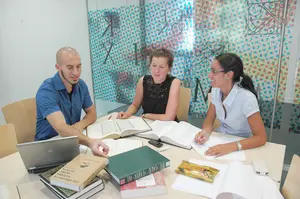
Please note!
The course is taught in German. For enrollment and successful studies, you need knowledge of German at level C2 of the Common European Framework of Reference for Languages (CEFR).
This page offers you an initial overview of the course. Details such as the structure of the course or information on how to apply can be found on the German website of the course. If you have any questions, the subject advisory service is available to you.
Our International Office provides information for international students. Please take a look at their website:
Please clarify the entry and residence regulations that apply to your nationality in advance.
Bamberg and the Arab World
The master’s degree programme in Arabic Studies is focused on imparting expert knowledge of Arabic language, literature and culture, from pre-Islamic times to the present.
In Bamberg, you will acquire the skills necessary to analyse, interpret and contextually classify both classical and modern Arabic texts. The programme places particular emphasis on the analysis of varying literary genres ranging from poetry and artistic prose to historical texts, and on to academic encyclopaedias and modern, cross-media forms of expression.
The programme’s close ties to further fields in Middle Eastern Studies, as well as its excellent cooperation with the University of Bamberg’s other philological and cultural studies disciplines, all ensure comparative perspectives and provide students with the opportunity to individually define areas of specialisation within the curriculum.
Structure of the Master's Degree
Programme Curriculum
The programme is laid out on a four-semester timetable, and the curriculum comprises the writing of a master’s thesis, core content in at least one field of Arabic Studies and a distribution elective which may be defined according to students’ individual, interdisciplinary interests.
Programme Objectives
- Advanced proficiency in standard and colloquial language
- Increased methodological and theoretical access to classical and modern Arabic literature
- Qualified work with primary and secondary Arabic source literature
- Learning and implementing skills pertaining to literary studies
- Independent scholarly workSubject
Good Reasons to Study with Us
Academic Networking within Middle Eastern Studies
In addition to Arabic Studies, the Institute for Middle Eastern Studies is home to numerous subjects whose modules students may combine with the programme’s core curriculum: Iranian Studies; Islamic Studies; Turkish Studies; Islamic Art and Archaeology; Jewish Studies; and General Linguistics.
An Excellent Learning Environment
Our ratio of academic staff to students is outstanding, the Middle Eastern Studies departmental library is well stocked and getting around the town and university is fast and easy.
Internationality and a Dedicated Student Body
Owing to its partnerships with approximately 300 other universities, the University of Bamberg is especially colourful and international. And with the Arbeitskreis Orient (Middle Eastern Studies research group), Bamberg’s students of Middle Eastern Studies make an active contribution to life at the institute.
Your Qualifications
Requirements for an application for the master’s degree in Arabic Studies:
- University degree (B.A. or higher) in the field of either Humanities or Social Sciences. Certificate and transcript of records are needed.
- Proof of at least 15 ECTS-points in the field of "Oriental Studies" (Arabic Studies, Islamic Studies, ...)
- Proof of at least 40 ECTS-points in Arabic language classes or proof of equivalent knowledge of Arabic.
- Proof of English language proficiency of at least level B1.
Your Qualifications
Requirements for an application for the master’s degree in Arabic Studies:
- University degree (B.A. or higher) in the field of either Humanities or Social Sciences. Certificate and transcript of records are needed.
- Proof of at least 15 ECTS-points in the field of "Oriental Studies" (Arabic Studies, Islamic Studies, ...)
- Proof of at least 40 ECTS-points in Arabic language classes or proof of equivalent knowledge of Arabic.
- Proof of English language proficiency of at least level B1.
Hinweise für Redakteure und weitere Beispiele
Deutschsprachige Studieng?nge sollen zumindest über einen englischsprachigen Miniauftritt verfügen, der erste Informationen zum Studiengang bietet und dabei einen geringen Pflegeaufwand hat. Sinnvoll ist daher eine abweichende Struktur zum deutschen Auftritt. Im Englischen k?nnen die Texte aus den Studiengangsflyern verwendet werden. Somit werden die folgenden Punkte kurz dargestellt:
- Einleitung / Profil des Studiengangs
- Aufbau des Studiengangs mit einer Strukturgrafik
- Qualit?tsmerkmale
- Bewerbung und Zulassung
(Bei diesem Punkt soll auf Besonderheiten für internationale Interessierte eingegangen werden) - Berufsperspektiven / Weiterführung des Studiums bzw. Promotion
- Hinweise auf weiterführende Informationen im Deutschen Webauftritt
- Ansprechpersonen mit 188bet亚洲体育备用_188体育平台-投注*官网daten
Studiengangsbeauftragte bzw. Studiengangsbeauftragter / Fachstudienberatung / Akademisches Auslandsamt
Bei der ?bersetzung von Texten ist das ?bersetzungsbüro behilflich. Zudem wird ein Glossar angeboten, in dem Sie h?ufig verwendete Begriffe bereits übersetzt finden. Bitte verwenden Sie diese, da diese Begriffe unweit abgestimmt sind.
Englischsprachige Studieng?nge sollen im Gegenzug ?hnliche Informationen im Deutschen Webauftritt anbieten.





